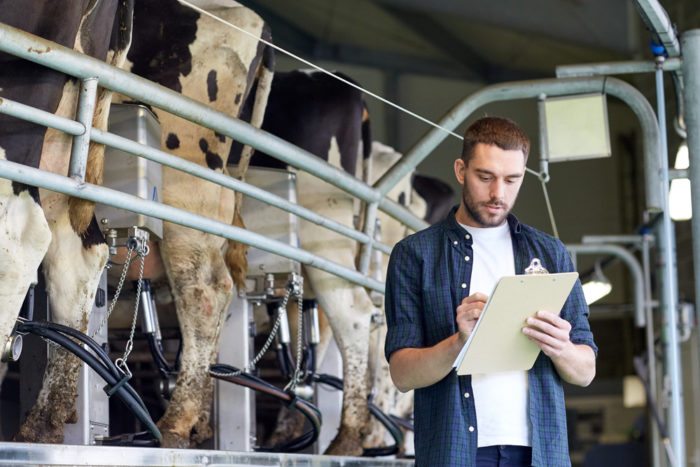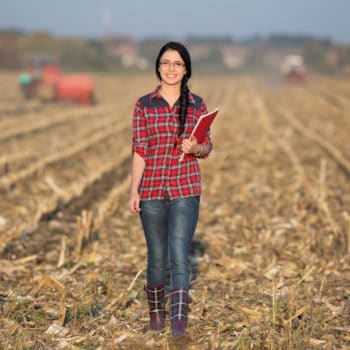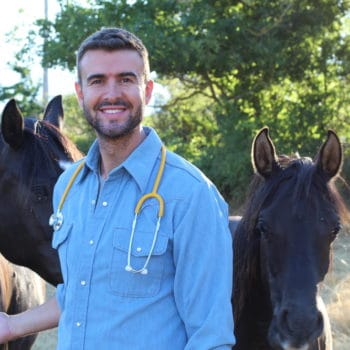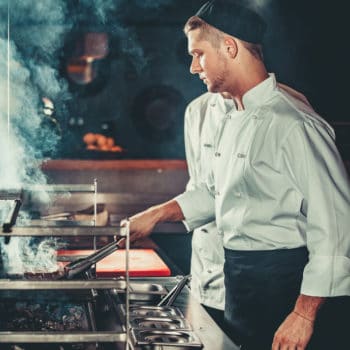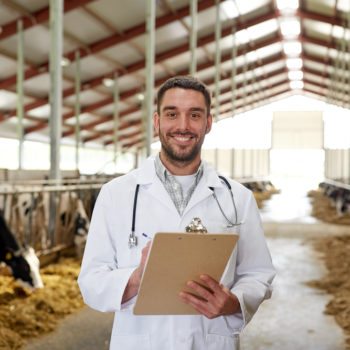Why We Love It
-
$62,280Potential Avg. Salary
-
4.7%Job Growth Rate
-
Growing DemandJob Outlook
-
Deal MakingCareer Attribute
Livestock buyers purchase and resell livestock like cows, chickens, pigs, ostriches, and llamas. They travel between their home base, auctions, and farms to purchase livestock and sell them to farm owners for profits, or to acquire impressive livestock for the food production companies they work for.
Recommended Schools
What is a Livestock Buyer?
The following job responsibilities are common for individuals in livestock buyer roles:
- Attend actions and other livestock sales events to make purchases
- Quickly evaluate the quality and condition of livestock to ensure purchases will be profitable
- Sell purchased livestock to farm owners and other buyers
- Arrange for transportation of livestock from auctions to holding areas, and then to buyers
- Negotiate contracts and prices with buyers
A Day in the Life
Livestock buyers purchase livestock—cows, pigs, chickens, ostriches, sheep, llamas, and other farm animals—and either deliver them to their employers or resell them to farm owners for profits. Livestock are generally sold at auctions, and livestock buyers attend these auctions, evaluate the quality and health of livestock quickly, and purchase the most impressive specimens. Livestock auctions can happen in locations all over the country, so livestock buyers may travel frequently to make purchases.
Some livestock buyers work to buy and resell livestock to farm owners. These livestock buyers simplify the acquisition of new livestock for the farm owners because owners don’t have to attend auctions on their own to acquire new livestock. Instead, they work with livestock buyers to evaluate livestock and negotiate a price. Livestock buyers in this role must be adept in evaluating livestock, educated in signs of poor health, and fierce negotiators who can convince buyers to pay prices that result in profitability.
Other livestock buyers may be employed by food production companies and work to purchase new livestock for the companies they work for. This role is different because the livestock buyer doesn’t have to find ways to sell purchased livestock—they simply deliver purchases to their employers. However, all other tasks are the same between the two roles. Additionally, livestock buyers must help with transporting the animals they purchase, so they must take caution to deal with angry livestock.
Typical Work Schedule
Livestock buyers typically work long hours and travel frequently for work—it is not a 9-5 job. They may be at auctions from very early in the morning until late in the evening, and then travel after the auction to a different location for an auction occurring the next day. However, certain times of year—summer and winter specifically—are slower for livestock buyers, so they may have seasonal breaks where they’re able to work fewer hours and take vacations.
Typical Employers
Many livestock buyers are self-employed and sell the livestock they purchase to farm owner clients. Others may be employed by food production and distribution companies, or they may work for livestock auction companies.
Recommended Schools
How To Become a Livestock Buyer
No formal higher education is required to become a livestock buyer. In fact, experience working with and evaluating livestock on farms or ranches provides some of the best experience for aspiring livestock buyers. The most important credential for a livestock buyer is the ability to identify promising and high-quality livestock, and that type of experience may be better learned by working directly with animals than in a classroom.
However, livestock buyers do much more than simply evaluate and purchase livestock. Many of them must also sell the livestock they purchase to buyers. This requires negotiation skills, business acumen, networking ability to find and keep clients, and marketing talents. For this reason, aspiring livestock buyers may benefit from a dual approach to working towards the career—working directly with animals on a farm or ranch and earning a bachelor’s degree in a relevant field from a college or university.
Degrees that aspiring livestock buyers commonly pursue include business, marketing, animal science, animal marketing, or agricultural business. Majors focused on animal care and biology help livestock buyers evaluate livestock more proficiently, and business and marketing coursework teaches livestock buyers how to run a business, create contracts, network, manage finances, and market their services. Additionally, most food production companies will expect their livestock buyers to have a degree.
Livestock Buyer Salary Data
We’ve provided you the following to learn more about this career. The salary and growth data on this page comes from recently published Bureau of Labor Statistics data while the recommendations and editorial content are based on our research.
National Anual Salary
Low Range
$41,690Average
$62,280High Range
$101,180National Hourly Wage
Low Range
$20/hrAverage
$30/hrHigh Range
$49/hrHow do Livestock Buyer salaries stack up to other jobs across the country? Based on the latest jobs data nationwide, Livestock Buyer's can make an average annual salary of $62,280, or $30 per hour. On the lower end, they can make $41,690 or $20 per hour, perhaps when just starting out or based on the state you live in.
Salary Rankings And Facts
#247 Nationally for All Careers
Above Average Salary Nationally
Programs and Degrees
Here are the most common degrees for becoming a Livestock Buyer. a is usually recommended and specifically a degree or coursework that prepares you for the particular field, see below.
Highest Education Among Livestock Buyers
- 0.6% Doctorate
- 6.3% Masters
- 25.2% Bachelors
- 5.5% Associates
- 20.2% College
- 28.7% High School
- 13.4% Less than High School
Job Growth Projections and Forecast
2014 Total Jobs
12,9002024 Est. Jobs
13,500Job Growth Rate
4.7%Est. New Jobs
600How does Livestock Buyer job growth stack up to other jobs across the country? By 2024, there will be a change of 600 jobs for a total of 13,500 people employed in the career nationwide. This is a 4.7% change in growth over the next ten years, giving the career a growth rate nationwide of Above Average.
Growth Rankings And Facts
#452 Nationally for All Careers
Above Avg. Growth Nationally
What Companies Employ The Most Livestock Buyers
| Industry | Current Jobs | New Jobs Needed | % Increase |
|---|---|---|---|
| Grocery and related product wholesalers | 1,900 | 100 | 0% |
| Self-employed workers | 1,800 | --- | --- |
| Farm product raw material merchant wholesalers | 1,400 | 100 | 0% |
